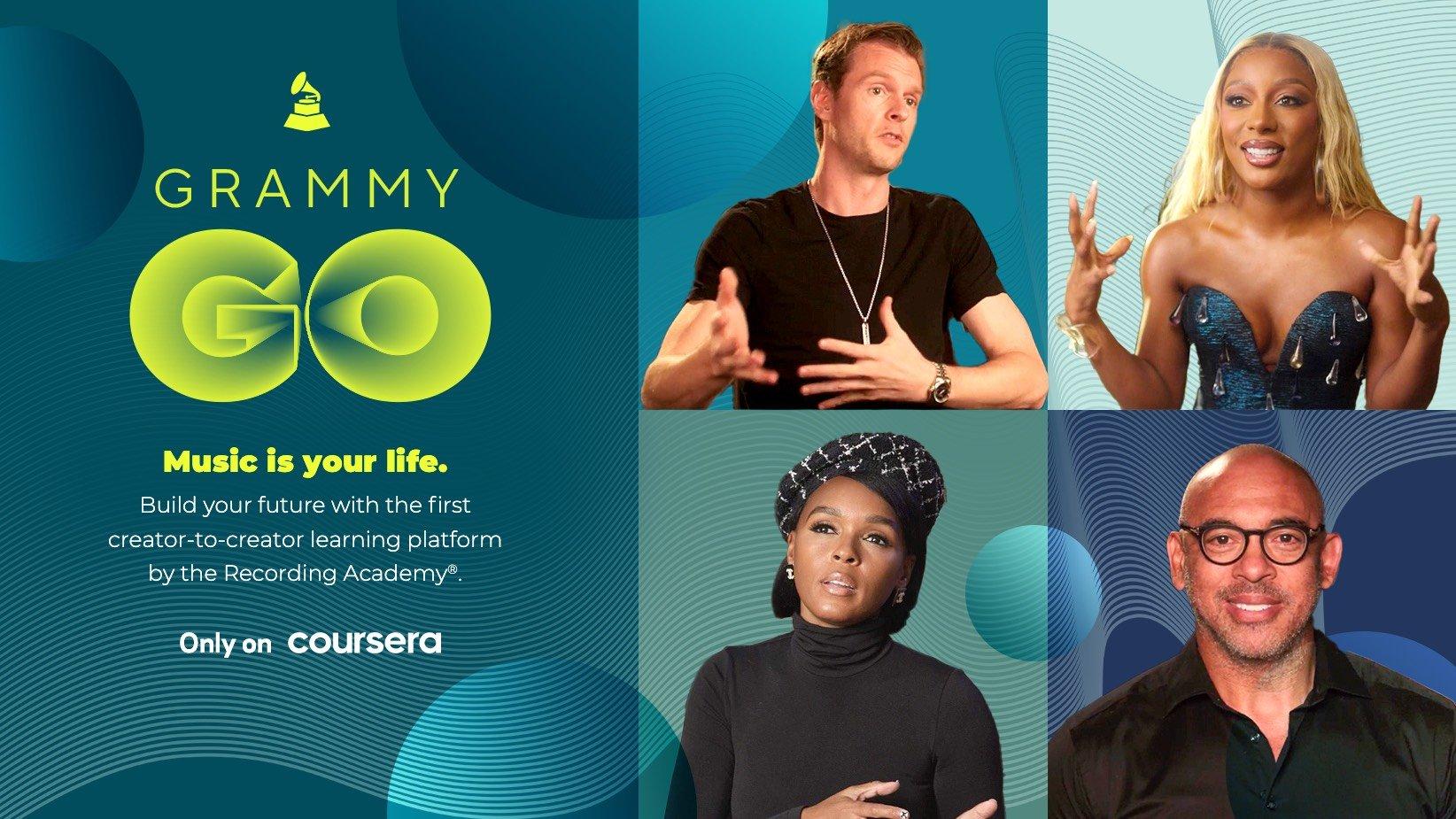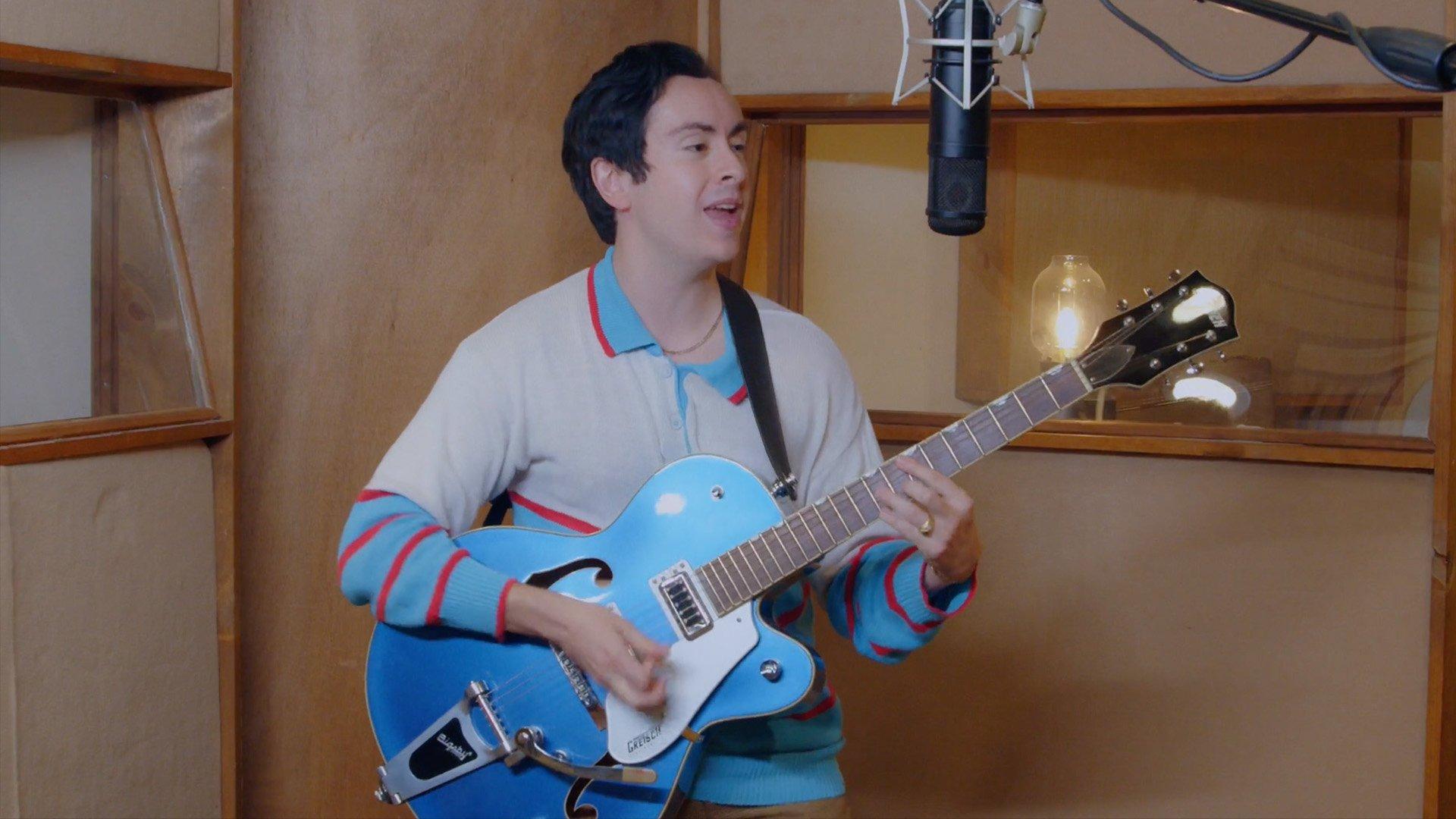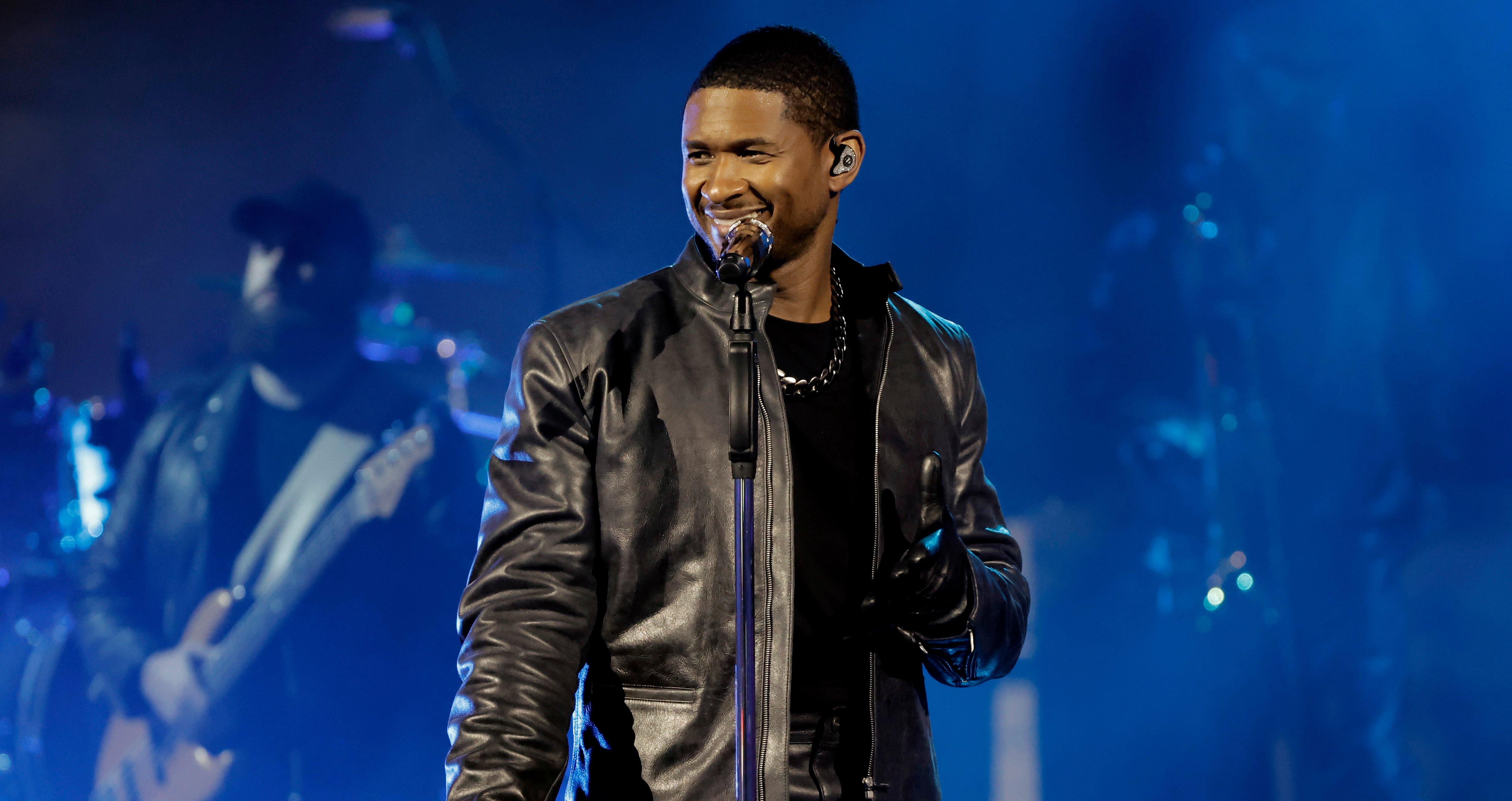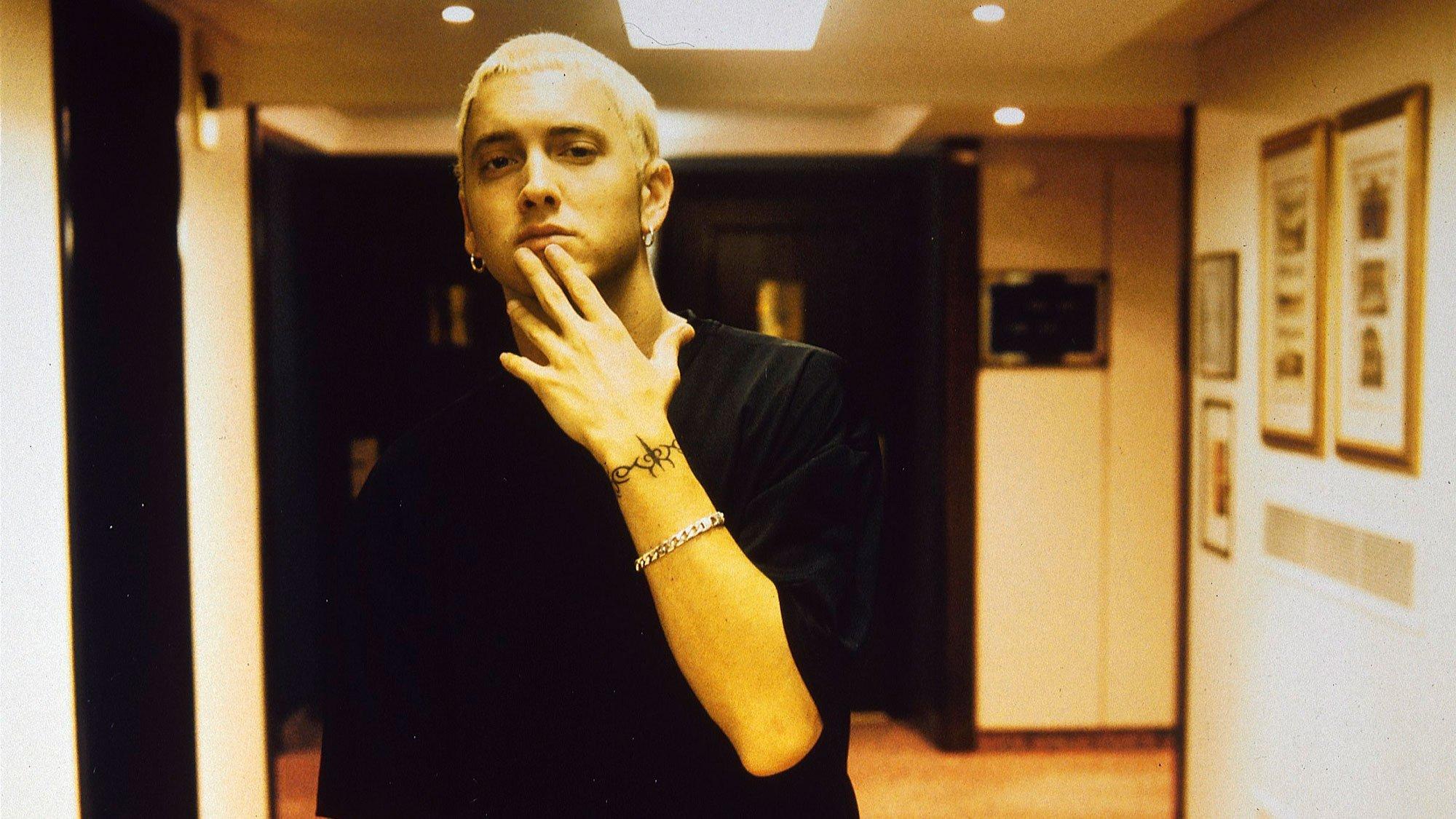"All of us have our Pandora's boxes or skeletons in our closets," Usher told MTV News while promoting his 2004 album, Confessions. "I've got a lot of things and stuff built in me that I just want to let go of."
He sure wasn't kidding. The concept album, and loosely based around his relationship with TLC's Rozonda "Chilli" Thomas — essentially played out like a prime-time soap opera set to music. But its brutally honest narrative and earworm hooks connected like no other contemporary R&B record before or since, solidifying Usher as one of music's modern greats.
In fact, Confessions was the second-best selling album of the 2000s (only behind *NSYNC's 2000 juggernaut, No Strings Attached), thanks in part to four consecutive Billboard Hot 100 chart-toppers and a string of attention-grabbing videos that allowed Usher to showcase his skills as a singer, dancer, actor, and all-round loverman.
Just after delivering a career-defining Super Bowl halftime show performance, Usher celebrates 20 years of Confessions on March 23. To commemorate the anniversary, here's a look at why Confessions remains the R&B scene's definitive blockbuster.
It Saved The Record Industry
Thanks to the rise in illegal downloads and decline of "Total Request Live"-friendly blockbusters, the music industry began 2004 staring down a fourth consecutive year of declining sales. Step forward their savior, Usher Raymond IV.
Confessions shifted a colossal 1.1. million copies in its first week, the highest number since Eminem's The Eminem Show in 2002, and didn't stop selling. By the end of December, its total had ballooned to nearly eight million — double its closest competitor, Norah Jones' Feels Like Home, to become the year's biggest commercial smash.
Usher's magnum opus was widely credited with getting the American public back into record stores again, resulting in a 1.6 percent increase in overall album sales. But Confessions' journey wasn't done there. In 2012, it was awarded diamond status, joining TLC's CrazySexyCool and Boyz II Men's II as the only R&B representatives in the exclusive club, with its current tally now reportedly standing at 18 million!
It Invented Crunk&B
Crunk, an energetic form of southern hip-hop defined by its 808 basslines, kick drums, and general party-starting vibes, originated in the mid-1990s. But it took nearly a decade for the sound to crossover from the Miami underground to the top of the charts. And then the lead single from Confessions took the scene to another level.
With its high-pitched synth hook, emphatic beats, and hype man chants from the subgenre's self-proclaimed king Lil Jon, "Yeah!" had all the hallmarks of a crunk classic. But Usher's smooth, soulful tones and Ludacris' playful rhymes gave the dance floor anthem a much stronger melodic edge, prompting critics to coin a new term, Crunk&B.
Several artists took note of the crunk and contemporary R&B crossover, with both Ciara's "Goodies" and Chris Brown's "Run It" also topping the Hot 100. But "Yeah!" remains the sound's crowning glory, as proven by the diamond status it achieved right before Usher's Super Bowl halftime show (Usher is also now only the third ever Black artist to have a diamond-certified single and album, alongside Michael Jackson and Whitney Houston).
It Further Bridged The Gap Between R&B And Hip-Hop
While previous albums Usher, My Way, and 8701 had all been grounded in slick, soulful R&B, Confessions was a concerted attempt to bridge the gap between his signature sound and the grittier world of hip-hop. The man himself admits that he took just as much inspiration from Eminem and Bone Thugs-N-Harmony as his usual suspects, like Michael Jackson and James Brown, to create an album that was aimed equally at the bedroom and the clubs.
Alongside the famous guest appearances from Lil Jon and Ludacris, the LP also drew upon the production talents of Roc-A-Fella regular Just Blaze. Meanwhile, on the special edition, Jadakiss laid down some bars on "Throwback," while the remix of "Confessions Part II" boasted rhymes from Shyne, Twista, and Kanye West.
That's not to say thatNot that Usher forgot his roots, though., Has proven by his collab with Keys ("My Boo"), recruitment of legendary producers Jimmy Jam and Terry Lewis, and contributions from long-time collaborators Jermaine Dupri and Bryan-Michael Cox all helped remind of his R&B prowess. "I feel like it is the base of everything," Usherhe said about his love of R&B at the time. "I want to make it more prominent."
It Was A GRAMMY Favorite
Although Ray Charles posthumously won the most awards of the night, the 2005 GRAMMYs undoubtedly still belonged to Usher. The R&B star not only took home three golden gramophones, but he also brought the house down thanks to a spellbinding duet with the Godfather of Soul.
A sharp-suited Usher first took to the stage for an epically choreographed performance of Confessions' fifth single "Caught Up," before James Brown — who even at the age of 71 still had several moves of his own — popped up for a joint rendition of his classic, "Sex Machine."
Usher was no doubt in a celebratory mood. By this point, he'd picked up three of the eight categories he'd been nominated in: Best Contemporary R&B Album, Best Rap/Sung Collaboration for "Yeah!," and Best R&B Performance by a Duo or Group with Vocal alongsideAlicia Keys for "My Boo." (As of press time, Usher has won eight GRAMMYs and received 23 GRAMMY nominations.)
It Brought A Confessional Side Back To R&B
From Marvin Gaye's Here, My Dear to D'Angelo's Brown Sugar, some of the greatest R&B records of the 20th century resulted from artists baring their souls as if their lives depended on it. This was an approach that had largely fallen by the wayside as time went on, with some suggesting that the genre gradually became more emotionally stunted.
Usher, on the other hand, had no qualms whatsoever about laying it all on the line, namely the ups and downs of his relationship with Thomas. On the falsetto-voiced "Burn," he willingly displays devastation over his breakup ("I'm twisted 'cause one side of me's telling me that I need to move on/ On the other side I wanna break down and cry"). And even by the penultimate track, "Take Your Hand," he still seems to be in a state of torment ("In your loving, every time I feel your touch/ Second thoughts, more doubts started building up").
Usher's confessional approach continued in 2008 with Here I Stand's love letter to then-wife Tameka Foster and then again in 2010 with the divorce-themed Raymond vs. Raymond. And many other R&B artists, including Janelle Monae and Beyoncé, have since made career bests by delving similarly deep into their personal lives.
It Inspired A Generation Of R&B Lotharios
Think of any R&B lothario who's emerged in the last 20 years and chances are they've been heavily inspired by Confessions. Jason Derulo has said as much, describing it as a "classic album" and "just start to finish awesome"; Ne-Yo echoed that sentiment to BBC Radio 1, calling it "flawless top to bottom." While Bryson Tiller explicitly told Fuse he wanted to make a record in the same vein. And you can hear its influence in everything from Drake's more romantic offerings to August Alsina's intimate revelations.
And 10 years after Robin Thicke co-penned and co-produced Confessions' sensuous bedroom jam, "Can U Handle It," he released his own breakup tale with 2014's Paula. Though he hasn't ever explicitly cited Confessions as an influence, Paula is a concept album about Thicke's real-life marriage breakdown, which essentially doubled up as a begging letter to his estranged wife.
It's A Storytelling Masterclass
In 2023, it was announced that an untitled drama series inspired by Usher's back catalog was in the works. No doubt that the project, said to be "about Black love in Atlanta and individuals looking to find a place to call home," will draw heavily upon the storytelling masterclass that is Confessions.
Take "Truth Hurts," for example, the relationship tale in which Usher initially presents himself as the wounded party before revealing that he was, in fact, the one being adulterous ("I've been blaming you when I'm the one that's doing wrong/ I'ma go on/ My guilty conscience is the real reason I wrote this song").
Usher also appeared to enjoy keeping audiences guessing about whether his confessions were truly autobiographical or borrowed from the album's male-centric production team. See the two title tracks, which suggested the lothario had himself become a father following a one-night stand, when in reality, the paternity drama was all Dupri's.
"We wanted the media to ask us questions," the latteradmitted to Vibe in 2014, citingMichael Jackson as a key attention-grabbing influence. "Nobody knows who the f— Billie Jean is. We're still looking for her."
It Helped Breathe New Life Into Several Soul Classics
While much of Confessions was interested in pushing R&B forward, it wasn't entirely averse to getting a little nostalgic. The record is filled with cleverly chosen samples from the soul of yesteryear, from Harold Melvin and the Blue Notes' "Is There a Place for Me" on "Take Your Hand" to Willie Hutch's Mack's Stroll on "Superstar" and Preston Love's "Chili Mac" on "Whatever I Want."
And nearly 20 years before Doja Cat repurposed a Dionne Warwick classic to chart-topping effect on 2023's "Paint the Town Red," Usher brought the Motown legend into the contemporary R&B world by borrowing from "You're Gonna Need Me" on the aptly titled "Throwback."
It Broke Multiple Chart Records
You know an artist has reached true greatness when they start being mentioned in the same breath as The Beatles. In 2004, Usher became the first act since the Fab Four to have both the biggest and second biggest-selling singles of Billboard's year-end chart with "Yeah!" and "Burn," respectively. And this was far from the only major milestone Confessions achieved.
Until Taylor Swift's Fearless spent an additional fortnight in the top spot in 2009, the album's nine weeks atop the Billboard 200 was the longest run of the millennium. And with "Confessions Part II" also reaching No. 1 on the Hot 100 (ironically, replacing "Burn"), Usher not only became the first artist in history to achieve three consecutive chart toppers, but also the first act to spend more than half a calendar year atop the Hot 100 at 28 combined weeks.
Twenty years on, Confessions is still the highest-selling record by a Black artist this century. And further exemplifying his staying power and impact across the globe, Usher will soon embark on a lengthy world tour that has sold out from Brooklyn to Berlin — a momentous way to honor the album that changed the R&B game.
24 Songs Turning 20: Listen To 2004's Bangers, From "Yeah!" To "Since U Been Gone"




